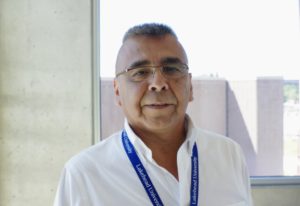The pupil becomes the teacher: the resurgence of Anishinaabemowin speakers

By Rick Garrick
THUNDER BAY—Isadore Toulouse of Wikwemikong Unceded Indian Reserve is back for his 25th year of teaching students how to teach Anishinaabemowin at Lakehead University’s Native Language Instructors Program (NLIP).
“One of the highlights is seeing the young people that are coming to take the NLIP whose parents were here originally,” Toulouse says. “We’re trying to train these young people to be teachers, to teach Anishinaabemowin. And we also have these older students who are taking the program who have the knowledge base of the culture, the traditions, and the life values that were shared to them by their parents and their grandparents.”
Toulouse says the students learn from each other as well as from their instructors.
“We as instructors try to get them to work collaboratively together to bring out the ideas that the older generation have as opposed to what the younger generation can share,” Toulouse says. “Right now, my group is creating a bilingual school. They are creating a school from scratch to see what kind of ideals they can add to the building of this school.”
Toulouse says there is a “great resurgence” of Anishinaabemowin speakers who understand the value of language.
“Those are the ones we are trying to reach today to get them to see that understanding of those traditional values that we have and to be able to teach our kids in the school system,” Toulouse says.
Toulouse has seen a change in the NLIP students as their communities recover their traditional teachings.
“These younger people who are becoming teachers are understanding more of their traditional values,” Toulouse says. “I’m seeing more of these young people that have a broader understanding of the traditional ways.”
Toulouse began teaching Anishinaabemowin about 34 years ago. He graduated from NLIP in 1991 and currently teaches Anishinaabemowin at Suttons Bay High School in Suttons Bay, Michigan.
“The language base on the U.S. side is very minimal, so we get a lot of imported teachers coming in from Canada to go in and teach in Michigan,” Toulouse says.
Wikwemikong’s Louise Recollet, a fourth-year NLIP student, works part-time as an immersion instructor with an Anishinaabemowin program in Bay Mills, Michigan, which is located near Sault Ste. Marie.
“I do the immersion program for ages 16 to 50,” Recollet says. “There’s about 10 to 20 students.”
Recollet looks forward to sharing the knowledge she acquired this year with her students in Bay Mills. She has been studying the written double-vowel system.
“I’ll be speaking more fluently with the language and understanding more of it,” Recollet says.
In addition to their NLIP classes, Toulouse and some of the instructors and students usually hold a traditional crafts sale on Wednesday evenings at the University Centre Agora.
“A lot of the students bring their wares and hopefully make a sale,” Toulouse says. “We usually get a good crowd.”
Lac Seul’s Patricia Ningewance-Nadeau, one of the NLIP instructors, offered a selection of the 10 Anishinaabemowin books she has published at her booth.
“I’m teaching two courses here this summer, one for graduates of the program,” Ningewance-Nadeau says. “It’s a writing course: Oral Literature. I have them studying oral literature, legends, stories and then they are making their own stories.”
Ningewance-Nadeau says there is a need for literature written in Anishinaabemowin, both fiction and non-fiction.
“We need our students of the future to have books to read so they can practice writing and comprehending language,” Ningewance-Nadeau says.
Ningewance-Nadeau plans to move to Sault Ste. Marie this fall to teach three levels of Ojibwa at Algoma University.


